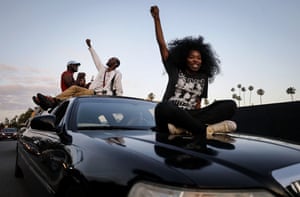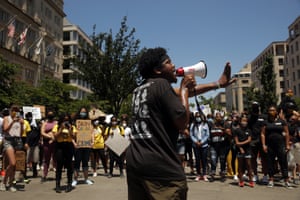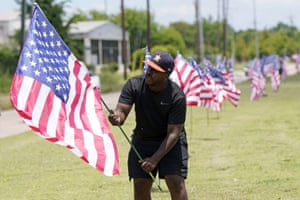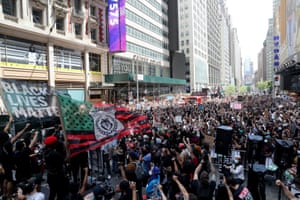George Floyd protests enter third week as push for change sweeps America
Scenes of largely peaceful protests markedly different from last weekend as the body of Floyd arrives in his hometown of Houston
- George Floyd killing – latest US updates
- See all our George Floyd coverage

Photograph: Mario Tama/Getty Images
Streets in countless cities and towns across America were filling with demonstrators again on Sunday as largely peaceful protests over systemic racism and police brutality, sparked by the death of George Floyd in Minneapolis, headed towards a third week.
The scenes were markedly different from the previous weekend, which saw police beating back protesters with teargas and batons, and a non-violent gathering in a Washington DC park on Monday forcibly cleared in military-style assault ahead of a photo opportunity for Donald Trump.
Meanwhile, the body of Floyd, 46, whose killing on Memorial Day when a Minneapolis police officer kneeled on his neck for almost nine minutes was captured on a now infamous video, arrived in his hometown of Houston on Sunday for a public viewing on Monday, and a private funeral Tuesday.
This weekend’s protests, which saw moments of levity and jubilance, appeared to reflect a shifting mood across the country.

On Saturday in Washington DC, more than 10,000 people poured into the streets, and coalesced at the feet of Abraham Lincoln at his giant marble memorial. The words Black Lives Matter had been painted in bright yellow letters along a street near the White House.
Mourners also paid their respects to Floyd in North Carolina, his birthplace and final resting place. Hundreds filed past his coffin, lining up outside Free Will Baptist church in Raeford in the searing heat to say a last goodbye.
Meanwhile, thousands gathered in New York’s Central Park and hundreds more gathered in Harlem for prayers and protest. Demonstrators chanted “get off our necks” and “racism is America’s original sin” as they marched uptown from the National Black Theatre in Harlem.
In Seattle, Washington, police used stun grenades to disperse a protest late on Saturday after bottles and rocks were thrown at them. But elsewhere, including Los Angeles, Chicago, New York, Miami, Philadelphia and Washington DC, gatherings of hundreds of thousands of people passed off relatively peacefully.
Tensions remained in Minneapolis, despite the arrest and charging this week of the four now fired officers involved in Floyd’s death. Jacob Frey, the city’s mayor, was shouted down by protesters after he refused to support their demands to defund the police department.
On Sunday, cities including Philadelphia and New York, which saw late-night violence earlier in the week, dropped or relaxed their curfews.
Others announced restrictions on police tactics that have come under scrutiny. Portland, Oregon, became the latest to ban the use of teargas, joining cities including Denver and Seattle, while California state and municipalities including Minneapolis, where Floyd died, have outlawed chokeholds and neck restraints.
In Washington DC on Sunday, federal troops that Trump insisted he could use to quell riots and looting, were sent back to their barracks.

The president, in what has become almost a weekend ritual, spent his Sunday morning sending furious tweets as developments unfolded, claiming the withdrawal of the National Guard was a victory for his administration “now that everything is under complete control” and excoriating his political foes, some of them prominent Republicans who this week criticised his heavy-handed approach to the protests.
Among them was Colin Powell, a key ally of the most recent Republican president George W Bush, who told CNN’s State of the Union on Sunday that Trump had “drifted away from the US constitution” and that he would vote for the Democratic candidate Joe Biden in November’s election.
He became the first major Republican figure to publicly back Biden, after a report in the New York Times on Saturday that other leading figures would not support Trump.
Powell’s words elicited a predictable response from Trump, who tweeted that the retired four-star general, national security adviser, chairman of the joint chiefs of staff and US Secretary of State was “a real stiff”.
Biden will travel to Houston and meet with Floyd’s family ahead of his funeral.
As well as the continuing demonstrations in many large cities, and across the globe in Europe, Australia and elsewhere, protests and rallies spread to numerous smaller towns in the US. One of them took place in Vidor, a tiny town in east Texas once a stronghold for the Ku Klux Klan, where dozens of protesters carrying Black Lives Matter placards rallied peacefully.
Bill de Blasio, the mayor of New York, announced on Sunday he was dropping the city’s curfew with immediate effect, after two days of relatively calm protests. “Yesterday and last night we saw the very best of our city,” de Blasio said in a tweet.
Defunding calls grow
Calls for defunding police departments nationwide have increased in volume this week, and Cory Booker, the Democratic senator and former presidential candidate, told NBC’s Meet the Press on Sunday that “we are over-policed as a society”.
Investing in police, he said, “is not solving problems, but making them worse.”

The Trump administration was criticised for ordering police to violently remove peaceful protesters in Washington DC’s Lafayette Park, tactics defended by attorney general Bill Barr on CBS’s Face the Nation on Sunday.
The network reported Trump demanded 10,000 active duty troops be used to quell protests in the capital, but received pushback from Barr, defence secretary Mark Esper and others.
“The decision was made to have at the ready and on hand in the vicinity some regular troops, but everyone agreed that the use of regular troops is a last resort and that as long as matters can be controlled with other resources they should be,” Barr insisted.
“I felt, and the secretary of defence felt, that we had adequate resources and we wouldn’t need to use federal troops but in case we did we wanted them nearby. The president never asked or suggested we needed to deploy regular troops at that point.”
Barr also denied the police were systematically racist. “I think there’s racism in the United States still but I don’t think that the law enforcement system is systemically racist,” said Barr. “I understand the … the distrust, however, of the African American community given the history in this country.”
Material from AP and Reuters was used in this report



